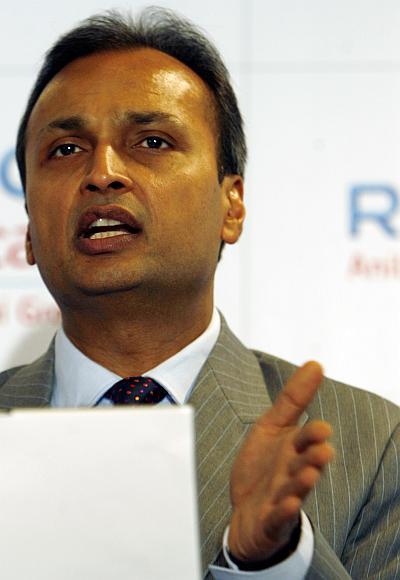
With over Rs 38,000 crore (Rs 380 billion) in debt and a mere 6.6 per cent of the telecom market's revenue at the end of 2012, Anil Ambani-controlled Reliance Communications has been struggling to stay afloat.
Not surprisingly, it has fallen to almost the bottom of the heap at number six in the pecking order of telecom companies - behind Bharti Airtel, Vodafone, Idea Cellular, BSNL and Tata Teleservices.
If Telecom Regulatory Authority of India figures are anything to go by, the company has even been losing subscriber market share in the wireless space.
Its market share fell from 14.82 per cent in August 2012 to 13.92 per cent in February 2013, even as most of its key competitors like Bharti Airtel, Vodafone and Idea saw an increase in their share during the period.
However, RCom is fighting back to get into the game. One plank of the plan is to monetise its assets and sign up long-term contracts for utilising its infrastructure, which will help it in cutting its interest outgo of Rs 2,800 crore (Rs 28 billion) a year by a third.
...

The other plank of the strategy is to go aggressively for post-paid customers where its rivals, Bharti Airtel, Vodafone and Idea, hold sway, even if it means a price war.
Thirdly, it is pruning costs wherever it can by outsourcing its network operations and substantially reducing its manpower costs.
Lastly, it is also making fresh investments, albeit cautiously, to expand its network. But here again it is looking at reducing the requirement for capital through tie-ups.
Ringing in change
RCom believes the time is just right to change track. Gurdeep Singh, chief executive of RCom, says: "We are beginning to see a phase of consolidation in the industry, with smaller players either closing down or scaling back operations. With this, pricing power is moving back to long-term operators. This is, therefore, the right time for RCom to undertake initiatives to cement its position."
The monetisation route, of course, will depend on its ability to pull off the deals it is negotiating and the price at which those deals are sealed.
...

RCom clearly wants to get out of its international business by selling Reliance Globalcom which houses its submarine cable operations across the globe.
Talks are on with a group of private equity funds led by Samena Capital to sell 70 to 80 per cent of the company. Experts reckon it should fetch RCom Rs 5,500 crore to Rs 6,000 crore (Rs 55 to 60 billion).
However, many say that is too steep a price, especially when there is a glut in the submarine cable capacity. They say that is the reason why RCom's attempt a few years ago to sell the assets through an IPO in Singapore fell through.
But if the deal goes through, it would reduce the company's debt to around Rs 32,000 crore (Rs 320 billion), from Rs 38,000 crore (Rs 380 billion), straightway.
The second element of reducing its interest burden is to get assured additional income. That is why RCom is striking a three-stage deal with Mukesh Ambani's Reliance Jio to rent out its fibre optic backbone as well as its towers across the country.
...

To begin with, RCom has already tied the knot for inter-city fibre optic network under which it will get a one-time payment of Rs 1,200 crore (Rs 12 billion) from Reliance Jio.
It is also close to signing a deal with Reliance Jio to let the company use its intra-city fibre network (it is more expensive as getting right of way to build it from scratch is time consuming) which is expected to fetch RCom anything between Rs 2,000 crore and Rs 3,000 crore (Rs 20 billion and Rs 30 billion) as one-time payment. This money, too, would go to reduce its debt.
Another source of money for RCom would be its deal with Reliance Jio to rent out its 50,000 towers across the country.
Those close to the deal, however, say RCom may have to give a discount of at least 20-30 per cent over the prevailing rent of Rs 30,000 a month per tower to clinch the deal.
Reliance Jio, which would be rolling out its 4G service in almost 100 cities, will require about 30,000 towers in the initial stages.
...
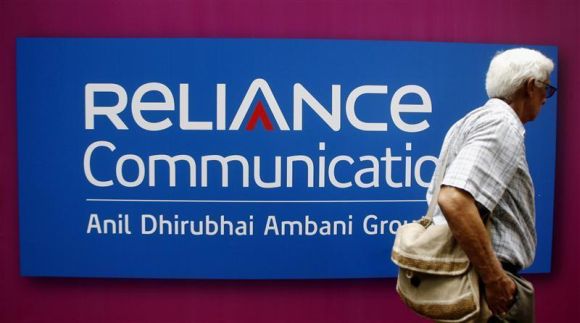
Based on these assumptions, RCom would be able to generate an annual assured income of anything between Rs 720 crore and Rs 860 crore (Rs 7.2 billion and Rs 8.6 billin) from rentals.
Generating more cash
The sale of Globalcom, along with the deal with Reliance Jio, could bring radical improvements for RCom by lowering its interest outgo.
The net additional interest outgo in a year would fall to a comfortable around Rs 1,000 crore a year, nearly a third of what it is currently.
Surely, debt reduction is a key strategy for survival, without which a large part of the company's cash flows get diverted to paying just interest.
In addition, the company is also hoping to shave off at least 5 per cent of its costs by going for an outsourcing model, like Bharti Airtel, instead of doing everything in-house.
...

It has already shifted 9,000 employees to Ericsson and Alcatel Lucent, which handle RCom's end-to-end network operations.
Another 3,000 employees who were working in RCom's BPO operations will be shifted too. As a result, RCom will be able to prune its employee strength by half to 10,000, amongst the lowest in the industry.
That done, RCom is also looking to shore up its ARPU (average revenue per customer). The problem currently is that it is over dependent on pre-paid customers, which constitute over 96 per cent of its subscriber base.
It does not have a fair share of high-paying post-paid customers who are important for two reasons, namely their loyalty factor and the fact that in GSM they generate ARPUs which are over six times what the companies get from pre-paid customers (Rs 83 a month) and as much as ten-times more in comparison to CDMA users.
...
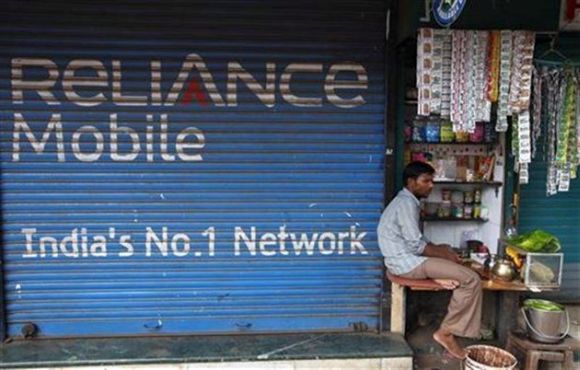
This simply means that they offer better profit margins and shore up revenues which get reflected in the bottom line.
The post-paid subscribers also spend a lot on roaming and STD and include the bulk of corporate customers.
Those in the know say that RCom is planning to disrupt this market by offering value-added services at a lower tariff.
"While tariff and value-added service innovation has been seen in pre-paid business, most operators have kept post-paid tariffs high without any major innovation," says an analyst.
The target is to get an additional 2 per cent to 3 per cent revenue share of the mobile market.
It is also trying to push its CDMA customers who are only interested in voice to shift to GSM. This will help RCom divert some spectrum to data services where ARPUs are much better.
...
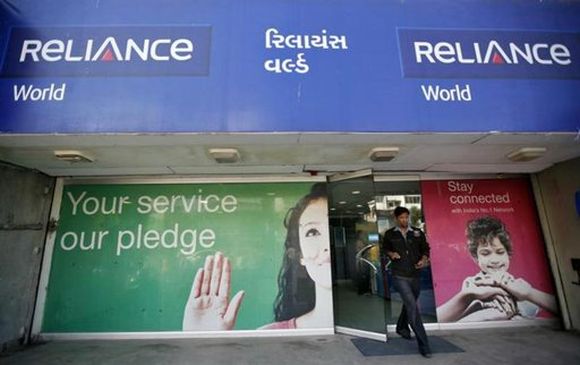
The company has identified 13 circles in which it has the entire suite of services - 2G, 3G as well as CDMA. The goal is to take leadership position in the data space in these markets by expanding its footprint.
Increasing its subscriber base has been the biggest challenge for RCom. To bring its network at par with other players in the industry, RCom is planning to undertake network coverage expansion through intra-circle arrangements with other telcos in the 2G space.
The target is to enhance its 2G GSM network footprint by 10,000 base stations and bring in an addressable market of over 150 million customers. It has already signed up its first agreement with Aircel.
The company has also made a commitment to invest Rs 1,500 crore (Rs 15 billion) directly to expand its network, especially in areas where it already has coverage and to expand its 3G network.
Surely, RCom has charted out a clearly thought-out strategy to steady its boat. However, the future will depend on how well it is able to implement its monetisation plans.
...

Turnaround Strategy
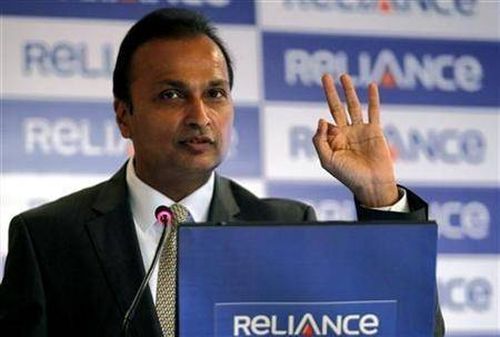
Challenges